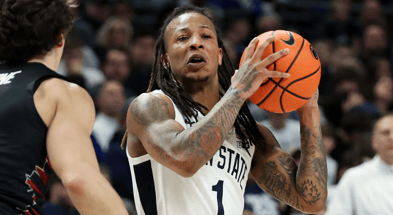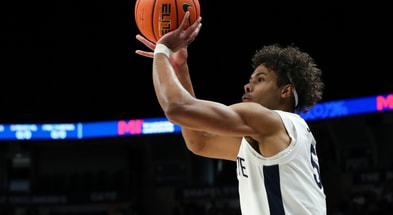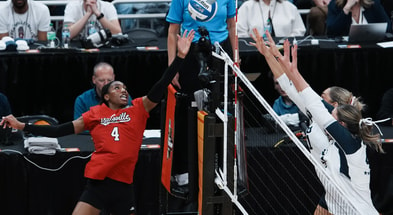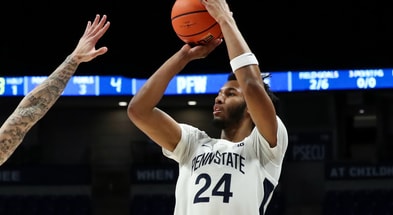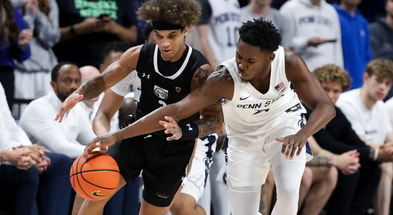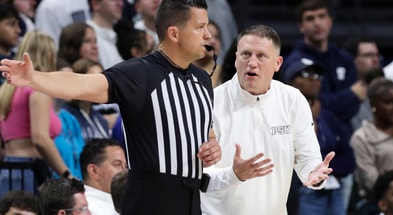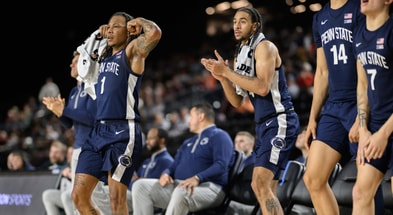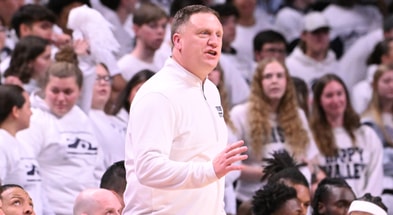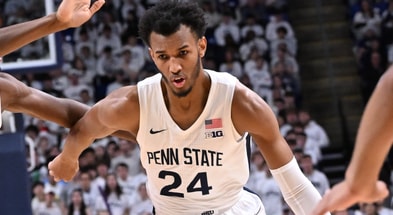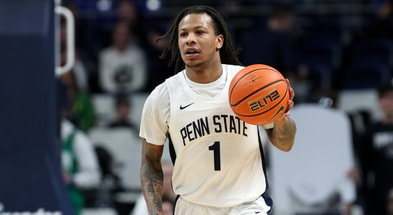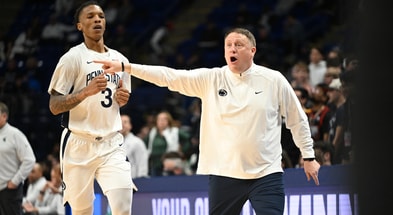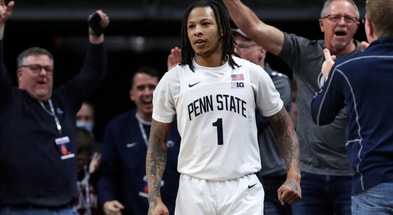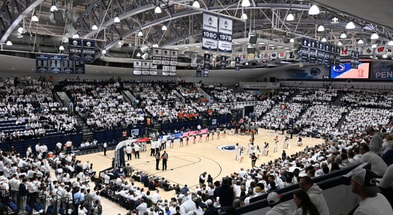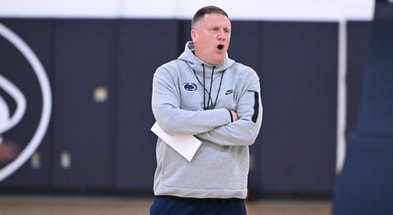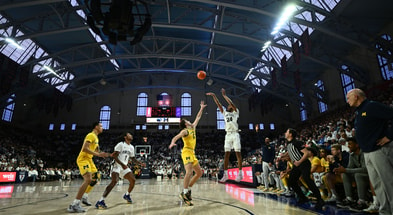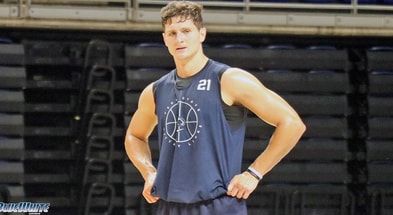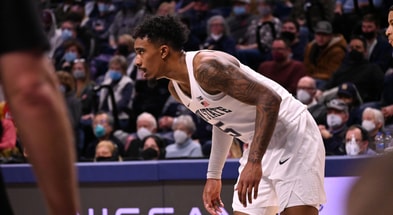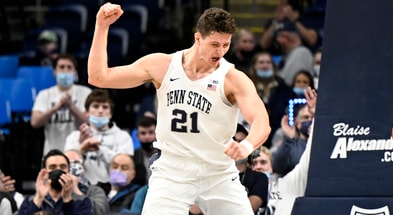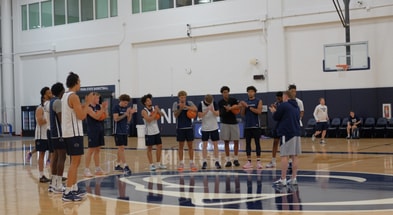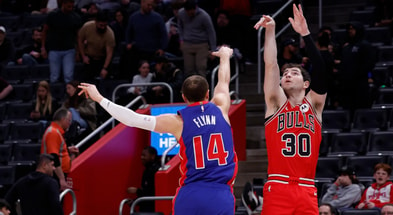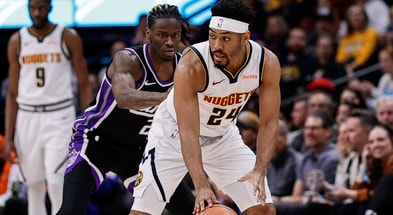John Harrar in his element: Dumbbells, devotion and a Penn State legacy
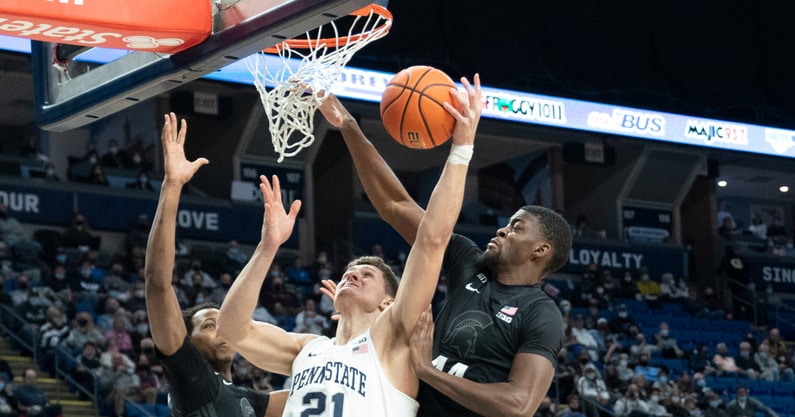
The slow, rolling sound of Chris Stapleton’s “Tennessee Whiskey” leads the way to the weight room inside Penn State’s Bryce Jordan Center. There, John Harrar sits alone, dumbbells in hand.
Less than an hour had passed since Harrar, the soul of the Nittany Lions’ basketball program, walked off the court here. His final act, a blowout loss to the struggling Nebraska Cornhuskers, left his emotions raw.
The fifth-year forward — who began as a big-bodied bully and sculpted himself into a basketball player with touch and guile, who returned to Happy Valley when others didn’t after a controversial coaching change, who dreamt of taking Penn State to the NCAA Tournament for the first time in a decade — exited the game in its final minute to a standing ovation, tears spilling out of his eyes.
Still clad in his game shorts and a sleeveless white undershirt, Harrar is here to do what he does after every home game. Circumstances don’t change his habits.
“The demons can’t talk,” he grunts as he reps out a bench press set with 90 pounds in each hand. “The dumbbells are talkin’ now.”
*****
Harrar says his postgame pattern got its start during his freshman season, on the suggestion of his former coach at Strath Haven, Dave McFadden.
Initially, his routine centered around the VersaClimber, a vertical climbing simulator. After each home game that season, he’d spend a minute on that machine for each minute he sat on the bench.
Harrar played in 26 of Penn State’s 39 games that season. Twenty-one of those appearances lasted 10 minutes or fewer.
His workouts have evolved since then to reflect increases in playing time. Former Nittany Lions Lamar Stevens and Jamari Wheeler joined him occasionally to lift. Harrar and Trent Buttrick each climbed 1,000 feet on the VersaClimber after home games last season.
Guard Jalen Pickett transferred into the program this offseason, introducing himself to Harrar’s postgame habits.
“We go get treatment, and I’m walking by and he’s in there in a full lift, benching half the weight room,” Pickett said earlier this season. “This guy’s crazy. He can barely walk, but he’s like, ‘I gotta lift, Pick. I gotta lift.’”
Logging plenty of cardio with an average of nearly 27 minutes a game this season, Harrar now approaches this ritual with a bit more pragmatism. Honing in on strength training, his routine includes pull downs, bench press, back extensions, calf raises and squats. He increases the weight progressively as he bangs out five sets of each exercise.
“Everything I’m doing is injury prevention, probably except benching,” Harrar says.
He closes his workout with biceps and triceps, followed by a brutal three-minute plank.
So dedicated is Harrar to his postgame custom that he’s willing to accept some irritated looks from his mom and girlfriend, who often wait around for him after games.
It’s not restricted to home games, either. Once in a while he’ll indulge after a road trip.
After one away game this season, he worked out until about 3 a.m., then elected to sleep at the Bryce Jordan Center before heading to class the next morning at Penn State’s Smeal College of Business, which also resides in the northeast corner of campus.
“Why am I going to walk home just to go to class in three or four hours?” he reasoned.
Few players give as much on the court on a nightly basis as Harrar. One of two players in the Big Ten averaging a double-double, Harrar’s basketball toolbelt has grown more diverse over time. But the trusty hammer he can always reach for remains his motor.
“Nobody works harder than John,” Pickett said. “He’s in here every day at 1:30 working out, and then, even after that game — with how hard he’s working, he’s dying in the huddles and can’t even breathe — he comes in and lifts.”
Harrar has not missed a game in four seasons. He’s appeared in 125 consecutive games, and counting.
“He’s an iron man,” said strength coach Greg Miskinis. “He just takes every step possible to make himself better, and make those people around him better.”
*****
Ducking underneath the squat bar, Harrar insists that he has more to give, as does this Penn State team as a collective.
He knows, however, that this was a game the Nittany Lions couldn’t lose.
Nebraska entered Sunday night’s contest at 1-16 in the Big Ten. It shot 58 percent from the field against Penn State’s typically stout defense, dropping 93 points on the hosts. Harrar’s final game inside this arena was all but over by halftime.
“I’m just disappointed we didn’t play the right way for him,” Penn State coach Micah Shrewsberry said afterward.
The entire game was an emotional experience for Harrar. The television cameras caught him emphatically trying to cajole his teammates in the huddle during timeouts before burying his face in a towel.
The time spent with a weight in his hand and music blasting helps Harrar to cope with nights like these — to silence the voices of doubt within his own head.
“I call this demon time,” Harrar says over another Chris Stapleton song. “I got demons in my head, so this is how I get rid of ‘em.
“It’s discipline,” he continues. “That’s what discipline is, doing it when your own self is like, ‘Don’t do it, you can quit, you don’t have to do that now.’ That’s the shit — your self-talk. That’s what the demons are. You gotta fight them.”
Discipline helps Harrar center himself. His commitment to working on his body is far from the only aspect of his life that he approaches with a fierce dedication to habits, repetition and goal-setting.
He directed those fixations toward his goal of 10 rebounds in each game last season. His brother, J.T., sent him a text every morning about it. He kept an index card in his backpack with 10 rebounds written on it, and arrived to a similar reminder at his locker before every game.
“I set the goal, I had it all around me and I went to Indiana last year and I think I got 10 rebounds,” he says. “I just went on a tear, and that’s all I was thinking about.”
Top 10
- 1Breaking
Nebraska cancels on Vols
2026 & 2027 football series between Tennessee & Nebraska has been canceled
- 2
Beck, Cavinder car case
Suspect arrested after theft
- 3Hot
Lincoln Riley
USC coach sits down with J.D. PicKell
- 4
Paul Finebaum
CFB is at very dangerous point
- 5
Bracketology update
No. 1 seeds change in update
Get the On3 Top 10 to your inbox every morning
By clicking "Subscribe to Newsletter", I agree to On3's Privacy Notice, Terms, and use of my personal information described therein.
Harrar can reference the late character development author Earl Nightingale from memory, and spent all of last season texting Penn State guard Taylor Nussbaum a quote that epitomizes his outlook on life: “Success is the progressive realization of a worthy idea or goal.”
He doesn’t know how his brain became wired like this, but he says it changed his life — and his basketball career.
Harrar’s goal this year — the one he spoke publicly about before the season and used as a benchmark to measure himself and his legacy Sunday night — was The Big Dance. One last shot awaits Harrar and the Nittany Lions at the Big Ten Tournament in Indianapolis beginning March 9.
As of now, though, he says he doesn’t feel good about what he accomplished in blue and white.
“I really don’t,” Harrar says. “We’ve never made the NCAA Tournament.”
It’s pointed out to him that they essentially did make the field in 2020, when they went 21-10 before the pandemic canceled the postseason. He brushes the objection aside.
“Yeah, but we didn’t,” he says.
*****
Across the hall from Harrar’s workout, sophomore Penn State guard Dallion Johnson is getting shots up in the practice gym.
He’s the only other Nittany Lion still in the arena, having picked up the habit from Harrar.
“He’s on the John Harrar track, but he actually has talent,” Harrar says in his self-deprecating way. “I’m just telling you the truth. The kid was the Gatorade Player of the Year.”
Johnson won that award in the state of Massachusetts in 2019-20. This season, emerging to crack Penn State’s starting lineup, Johnson has incrementally increased his game time. There’s little doubt that the extra hours he’s putting in have played a part.
Harrar’s on-court production is crucial. Without him to anchor the defense and facilitate a ball-screen-heavy offense, the Nittany Lions would not have seven conference wins. But his influence on Johnson, among others, is where Harrar’s long-term impact is most evident.
“If he’s hurting at all, you wouldn’t know it,” Shrewsberry said. “You think about the guys that are young on our team, like a Dallion Johnson, a Caleb Dorsey, they see that on a daily basis. So now they’re looking, like, ‘If I wanna be successful in this league, that’s what I have to do.’
“They start to model that behavior. As they start to do it next year, we’ve got five freshmen coming in that are looking around and they’re watching and they see what those guys are doing…That’s how a culture gets built. That’s how a great program starts to form.”
They might choose to emulate his determination in alternative ways, spurning the postgame lifting session for some extra jump shots like Johnson. But, thanks to Harrar, nobody who returns to Happy Valley next season can say they’ve never seen what it takes.
The sting of the Nebraska disappointment receding with each rep, Harrar can acknowledge this impact.
If Shrewsberry gets this program turned around in the way Penn State fans hope, Harrar says he’ll feel he played a part.
His workout finished, Harrar brings up a lifelong friend of his, Patrick O’Kane, who texts him before and after every game without fail.
“That’s gonna be me with Shrews,” Harrar says, now smiling.
Thinking the way he always thinks, with an objective in mind, Harrar considers the impacts those texts can have.
“That support system travels,” he says. “If you carry that, if you’ve got a good support system, it’s easier for you to reach your goals.”
Harrar’s decision to remove his name from the transfer portal last spring, to return to Penn State when he could have played for a number of programs with a chance to go deep into March, is based largely on a sense of community — his support system.
He knows so many people in and around State College he might as well be the mayor. The social seeds he’s watered over the last five years have sprung into full bloom.
Harrar spent this season helping Shrewsberry plant some seeds of his own, even if he won’t be around to see them sprout into the program they both envision.
“He may not reap the benefits of that,” Shrewsberry said. “But he’ll know. The guys in our program will know this is how it started.”

